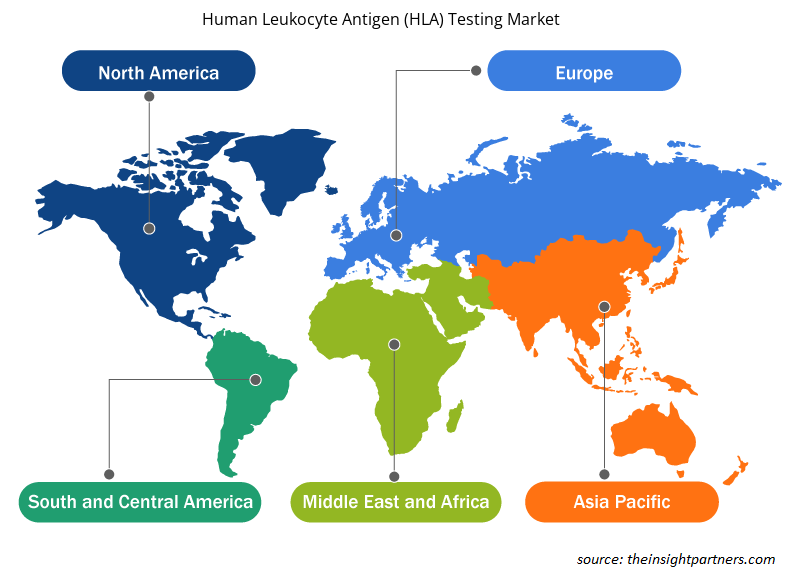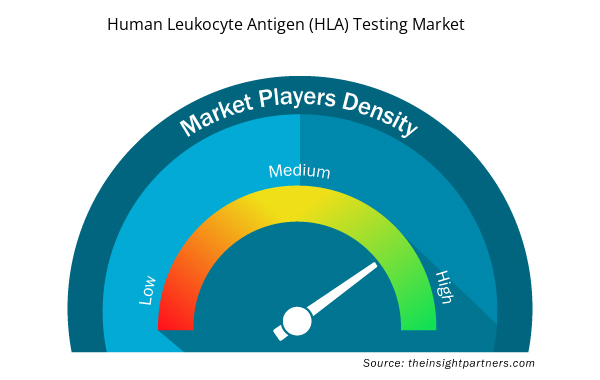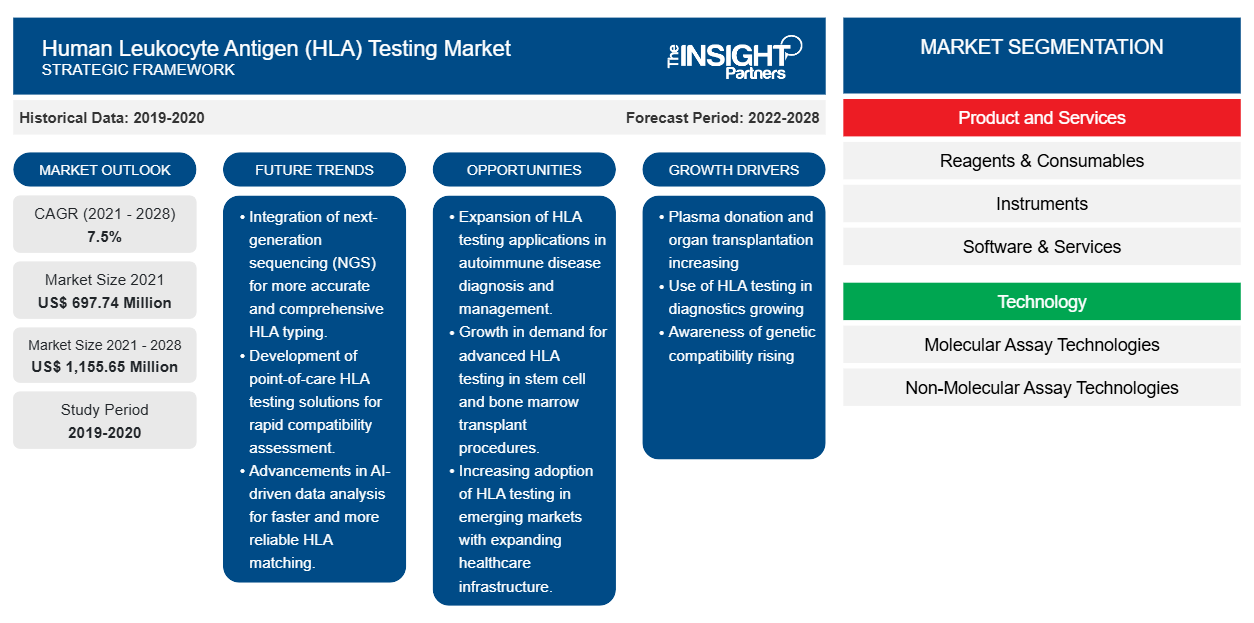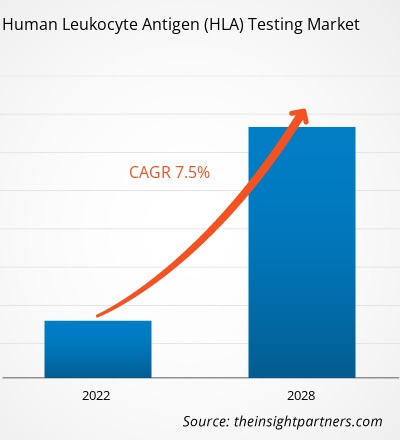人类白细胞抗原 (HLA) 检测市场规模预计将从 2021 年的 6.9774 亿美元增至 2028 年的 11.5565 亿美元;预计 2022 年至 2028 年的复合年增长率为 7.5%。 HLA) testing market is projected to reach US$ 1,155.65 million by 2028 from US$ 697.74 million in 2021; it is expected to register a CAGR of 7.5% from 2022 to 2028.
人类白细胞抗原在人体对外界物质的免疫反应中起着重要作用。HLA 检测的主要用途是将器官和组织移植接受者与相容的捐赠者进行匹配。HLA 检测还涉及筛查移植接受者是否存在可能针对捐赠组织或器官的抗体,作为免疫反应的一部分。
该报告提供了对人类白细胞抗原 (HLA) 检测市场的深入分析和见解,重点关注市场趋势、技术进步和市场动态等。它还提供了全球领先市场参与者的竞争格局分析。此外,它还包括 COVID-19 大流行对所有主要地区市场的影响。COVID-19 大流行在全球范围内造成了公共卫生危机和经济危机。在大流行之前,由于对器官捐献者、安慰和治疗的评估规律性,人类白细胞抗原 (HLA) 检测市场不断增长。第一波 COVID-19 扰乱了与 COVID-19 以外的疾病相关的咨询、随访和筛查。几家公司在 2019 年最后一个季度遭受了严重损失;大流行对 2020 年第一季度和第二季度的全球市场产生了不利影响。由于供应链中断以及对医疗产品和服务的需求增加,全球企业受到阻碍。为了减少医院和诊所的 COVID-19 感染,医护人员和患者采用并倾向于远程治疗患者。这些不可预见的情况也阻碍了器官移植程序。许多外科治疗和非紧急会诊被取消或推迟,许多机构暂停了选择性手术,以限制 SARS-CoV-2 的传播,并保留和重新分配资源,包括医护人员(护士和麻醉师)、医疗设备(个人防护设备和呼吸机)和病床。“待在家里”的建议导致器官捐赠和器官移植手术大幅减少。这些情况抑制了 2020 年全球人类白细胞抗原 (HLA) 检测市场的增长。
定制此报告以满足您的需求
您可以免费定制任何报告,包括本报告的部分内容、国家级分析、Excel 数据包,以及为初创企业和大学提供优惠和折扣
- 获取此报告的关键市场趋势。这个免费样品将包括数据分析,从市场趋势到估计和预测。
市场洞察
血浆捐献和器官移植手术数量的增加推动市场增长
人类白细胞抗原 (HLA) 是存在于人体除红细胞外所有细胞表面的特殊蛋白质。HLA 检测在器官移植中具有重要应用,可作为治疗肾衰竭、慢性肝硬化和慢性心脏病等医疗问题的一部分。慢性病和器官衰竭的患病率不断上升,导致对器官移植程序以及 HLA 检测的需求很高。移植前,会进行 HLA 测试以检查患者和捐赠者之间的组织相容性,避免移植排斥。近年来,移植已成为世界范围内的一项成功实践。根据全球器官捐献和移植观察站 (GODT) 发布的数据显示,2020 年,共记录了 129,681 例器官移植。其中,31.7% 为活体肾移植,20.40% 为活体肝移植。
各国政府都在采取措施,宣传器官捐献的必要性以及器官移植在某些治疗程序中的好处。例如,器官获取和移植网络 (OPTN) 已经实施了一些策略来提高美国的器官移植程序数量。这些策略的重点是增加终末期器官疾病患者的器官和组织移植数量、改变当前的器官分配以及通过重新分配现有的器官清单来修改器官移植候补名单。此外,OPTN 还采用了非常规策略来改善器官移植。这些创新策略包括优化使用从已故患者身上获得的器官[例如心脏死亡 (DCD) 后捐赠或脑死亡捐赠者]、减少器官丢弃、促进活体捐赠以及提高潜在器官捐赠授权率。
因此,器官移植需求的不断增长导致对大量HLA检测试剂盒和消耗品的需求,从而推动了HLA检测市场的增长。
基于产品和服务的洞察
根据产品和服务,人类白细胞抗原 (HLA) 检测市场细分为试剂和耗材、仪器以及软件和服务。2021 年,试剂和耗材部分占据了最大的市场份额,预计在预测期内将录得最快的复合年增长率 7.5%。 HLA) testing market is segmented into reagents and consumables, instruments, and software and services. In 2021, the reagents and consumables segment held the largest share of the market, and it is expected to register the fastest CAGR of 7.5% during the forecast period.
基于技术的见解
根据技术,人类白细胞抗原 (HLA) 检测市场分为分子检测技术和非分子检测技术。2021 年,分子检测技术占据了最大的市场份额,预计 2022-2028 年期间的复合年增长率将达到 7.7%。HLA) testing market is segmented into molecular assay technologies and non-molecular assay technologies. In 2021, the molecular assay technologies segment held a largest share of the market, and it is expected to record a higher CAGR of 7.7% during 2022–2028.
基于最终用户的洞察
根据最终用户,人类白细胞抗原 (HLA) 检测市场细分为独立参考实验室、医院和移植中心等。2021 年,独立参考实验室占据了最大的市场份额。然而,预计医院和移植中心在 2022-2028 年期间的复合年增长率最高,为 7.9%HLA) testing market is segmented into independent reference laboratories, hospitals and transplant centers, and others. In 2021, the independent reference laboratories segment held the largest share of the market. However, hospitals and transplant centers segment is expected to report the highest CAGR of 7.9% during 2022–2028
人类白细胞抗原(HLA)检测市场参与者采用产品发布和扩张等有机策略来扩大其全球影响力和产品组合,同时满足不断增长的产品需求。HLA) testing market players adopt organic strategies such as product launch and expansion to expand their footprint and product portfolio worldwide, along with meeting the growing product demands.
按地理位置
根据地域划分,人类白细胞抗原 (HLA) 检测市场分为北美(美国、加拿大和墨西哥)、欧洲(英国、德国、法国、意大利、西班牙和欧洲其他地区)、亚太地区(中国、日本、印度、澳大利亚、韩国和亚太地区其他地区)、中东和非洲(阿联酋、沙特阿拉伯、南非和中东和非洲其他地区)以及南美洲和中美洲(巴西、阿根廷和南美洲和中美洲其他地区)。
人类白细胞抗原检测
人类白细胞抗原 (HLA) 检测市场区域洞察
Insight Partners 的分析师已详细解释了预测期内影响人类白细胞抗原 (HLA) 检测市场的区域趋势和因素。本节还讨论了北美、欧洲、亚太地区、中东和非洲以及南美和中美洲的人类白细胞抗原 (HLA) 检测市场细分和地理分布。

- 获取人类白细胞抗原 (HLA) 检测市场的区域特定数据
人类白细胞抗原 (HLA) 检测市场报告范围
| 报告属性 | 细节 |
|---|---|
| 2021 年市场规模 | 6.9774亿美元 |
| 2028 年市场规模 | 11.5565 亿美元 |
| 全球复合年增长率(2021 - 2028) | 7.5% |
| 史料 | 2019-2020 |
| 预测期 | 2022-2028 |
| 涵盖的领域 | 按产品和服务
|
| 覆盖地区和国家 | 北美
|
| 市场领导者和主要公司简介 |
|
人类白细胞抗原 (HLA) 检测市场参与者密度:了解其对业务动态的影响
人类白细胞抗原 (HLA) 检测市场正在快速增长,这得益于终端用户需求的不断增长,而这些需求又源于消费者偏好的不断变化、技术进步以及对产品优势的认识不断提高等因素。随着需求的增加,企业正在扩大其产品范围,进行创新以满足消费者的需求,并利用新兴趋势,从而进一步推动市场增长。
市场参与者密度是指在特定市场或行业内运营的企业或公司的分布情况。它表明在给定市场空间中,相对于其规模或总市场价值,有多少竞争对手(市场参与者)存在。
在人类白细胞抗原 (HLA) 检测市场运营的主要公司有:
- 赛默飞世尔科技公司
- 凯迪克斯
- Qigen
- Illumina 公司
- Bio-Rad 实验室有限公司
免责声明:上面列出的公司没有按照任何特定顺序排列。

- 了解人类白细胞抗原 (HLA) 检测市场主要参与者概况
公司简介
- 赛默飞世尔科技公司
- 凯迪克斯
- Qigen
- Illumina 公司
- Bio-Rad 实验室有限公司
- TBG 诊断有限公司
- F.霍夫曼-罗氏有限公司
- 宝生物株式会社
- Luminex 公司
- Omixon 公司
- 测序中心
- 普罗特兰
- HistoGenetics LLC.
- CD 基因组学
- 昆塔拉生物科学公司
- 有限公司
- Creative Biolabs 公司
- 历史分析(2 年)、基准年、预测(7 年)及复合年增长率
- PEST 和 SWOT 分析
- 市场规模价值/数量 - 全球、区域、国家
- 行业和竞争格局
- Excel 数据集



Report Coverage
Revenue forecast, Company Analysis, Industry landscape, Growth factors, and Trends

Segment Covered
This text is related
to segments covered.

Regional Scope
North America, Europe, Asia Pacific, Middle East & Africa, South & Central America

Country Scope
This text is related
to country scope.
常见问题
Global human leukocyte antigen (HLA) testing market is segmented by region into North America, Europe, Asia Pacific, Middle East & Africa, and South & Central America. In North America, the U.S. is the largest market for human leukocyte antigen (HLA) testing market. The US is estimated to hold the largest share in the human leukocyte antigen (HLA) testing market during the forecast period. The presence of top players and favorable regulations related to product approvals coupled with commercializing new products are the contributing factors for the regional growth. Additionally, the increasing number of technological advancements is the key factor responsible for the Asia-Pacific regional growth for human leukocyte antigen (HLA) testing accounting fastest growth of the region during the coming years.
Thermo Fisher Scientific, Inc., CareDx, Inc., Qiagen N.V., Illumina, Bio-Rad Laboratories, Inc., TGB Diagnostics Ltd., F. Hoffman La-Roche Ltd., Takara Bio, Luminex Corporation, Oximon, The Sequencing Center, Protrans, HistoGenetics LLC, CD Genomics, Quintara Biosciences, CeGaT GmbH, Creative Biolabs, Inc., are among the leading companies operating in the global human leukocyte antigen (HLA) testing market
The molecular assay technologies segment dominated the global human leukocyte antigen (HLA) testing market and is likely to account for the revenue of US$ 626.86 million in 2022.
Human leukocyte antigens play an essential part in the body's immune response to external substances. The principal use for human leukocyte antigen (HLA) testing is to match organ and tissue transplant recipients with compatible donors. HLA testing also involves screening transplant recipients for the presence of antibodies that might target the donated tissue or organ as part of an immune response.
Increasing plasma donation and organ transplants procedures is one of the most significant factors responsible for the overall market growth.
Based on product and service type, reagent and consumables took the forefront leaders in the worldwide market by accounting largest share in 2021 and is expected to continue to do so till the forecast period.
Trends and growth analysis reports related to Life Sciences : READ MORE..
The List of Companies - Human Leukocyte Antigen (HLA) Market
- Thermo Fisher Scientific Inc.
- CareDx
- Qiagen
- Illumina Inc.
- Bio-Rad Laboratories, Inc.
- TBG Diagnostics Limited
- F.Hoffmann-La Roche Ltd.
- Takara Bio Inc.
- Luminex Corporation
- Omixon Inc.
- The Sequencing Center
- Protrans
- HistoGenetics LLC.
- CD Genomics
- Qunitara Biosciences
- CeGat GmbH
- Creative Biolabs Inc.
The Insight Partners performs research in 4 major stages: Data Collection & Secondary Research, Primary Research, Data Analysis and Data Triangulation & Final Review.
- Data Collection and Secondary Research:
As a market research and consulting firm operating from a decade, we have published and advised several client across the globe. First step for any study will start with an assessment of currently available data and insights from existing reports. Further, historical and current market information is collected from Investor Presentations, Annual Reports, SEC Filings, etc., and other information related to company’s performance and market positioning are gathered from Paid Databases (Factiva, Hoovers, and Reuters) and various other publications available in public domain.
Several associations trade associates, technical forums, institutes, societies and organization are accessed to gain technical as well as market related insights through their publications such as research papers, blogs and press releases related to the studies are referred to get cues about the market. Further, white papers, journals, magazines, and other news articles published in last 3 years are scrutinized and analyzed to understand the current market trends.
- Primary Research:
The primarily interview analysis comprise of data obtained from industry participants interview and answers to survey questions gathered by in-house primary team.
For primary research, interviews are conducted with industry experts/CEOs/Marketing Managers/VPs/Subject Matter Experts from both demand and supply side to get a 360-degree view of the market. The primary team conducts several interviews based on the complexity of the markets to understand the various market trends and dynamics which makes research more credible and precise.
A typical research interview fulfils the following functions:
- Provides first-hand information on the market size, market trends, growth trends, competitive landscape, and outlook
- Validates and strengthens in-house secondary research findings
- Develops the analysis team’s expertise and market understanding
Primary research involves email interactions and telephone interviews for each market, category, segment, and sub-segment across geographies. The participants who typically take part in such a process include, but are not limited to:
- Industry participants: VPs, business development managers, market intelligence managers and national sales managers
- Outside experts: Valuation experts, research analysts and key opinion leaders specializing in the electronics and semiconductor industry.
Below is the breakup of our primary respondents by company, designation, and region:

Once we receive the confirmation from primary research sources or primary respondents, we finalize the base year market estimation and forecast the data as per the macroeconomic and microeconomic factors assessed during data collection.
- Data Analysis:
Once data is validated through both secondary as well as primary respondents, we finalize the market estimations by hypothesis formulation and factor analysis at regional and country level.
- Macro-Economic Factor Analysis:
We analyse macroeconomic indicators such the gross domestic product (GDP), increase in the demand for goods and services across industries, technological advancement, regional economic growth, governmental policies, the influence of COVID-19, PEST analysis, and other aspects. This analysis aids in setting benchmarks for various nations/regions and approximating market splits. Additionally, the general trend of the aforementioned components aid in determining the market's development possibilities.
- Country Level Data:
Various factors that are especially aligned to the country are taken into account to determine the market size for a certain area and country, including the presence of vendors, such as headquarters and offices, the country's GDP, demand patterns, and industry growth. To comprehend the market dynamics for the nation, a number of growth variables, inhibitors, application areas, and current market trends are researched. The aforementioned elements aid in determining the country's overall market's growth potential.
- Company Profile:
The “Table of Contents” is formulated by listing and analyzing more than 25 - 30 companies operating in the market ecosystem across geographies. However, we profile only 10 companies as a standard practice in our syndicate reports. These 10 companies comprise leading, emerging, and regional players. Nonetheless, our analysis is not restricted to the 10 listed companies, we also analyze other companies present in the market to develop a holistic view and understand the prevailing trends. The “Company Profiles” section in the report covers key facts, business description, products & services, financial information, SWOT analysis, and key developments. The financial information presented is extracted from the annual reports and official documents of the publicly listed companies. Upon collecting the information for the sections of respective companies, we verify them via various primary sources and then compile the data in respective company profiles. The company level information helps us in deriving the base number as well as in forecasting the market size.
- Developing Base Number:
Aggregation of sales statistics (2020-2022) and macro-economic factor, and other secondary and primary research insights are utilized to arrive at base number and related market shares for 2022. The data gaps are identified in this step and relevant market data is analyzed, collected from paid primary interviews or databases. On finalizing the base year market size, forecasts are developed on the basis of macro-economic, industry and market growth factors and company level analysis.
- Data Triangulation and Final Review:
The market findings and base year market size calculations are validated from supply as well as demand side. Demand side validations are based on macro-economic factor analysis and benchmarks for respective regions and countries. In case of supply side validations, revenues of major companies are estimated (in case not available) based on industry benchmark, approximate number of employees, product portfolio, and primary interviews revenues are gathered. Further revenue from target product/service segment is assessed to avoid overshooting of market statistics. In case of heavy deviations between supply and demand side values, all thes steps are repeated to achieve synchronization.
We follow an iterative model, wherein we share our research findings with Subject Matter Experts (SME’s) and Key Opinion Leaders (KOLs) until consensus view of the market is not formulated – this model negates any drastic deviation in the opinions of experts. Only validated and universally acceptable research findings are quoted in our reports.
We have important check points that we use to validate our research findings – which we call – data triangulation, where we validate the information, we generate from secondary sources with primary interviews and then we re-validate with our internal data bases and Subject matter experts. This comprehensive model enables us to deliver high quality, reliable data in shortest possible time.


 获取此报告的免费样本
获取此报告的免费样本